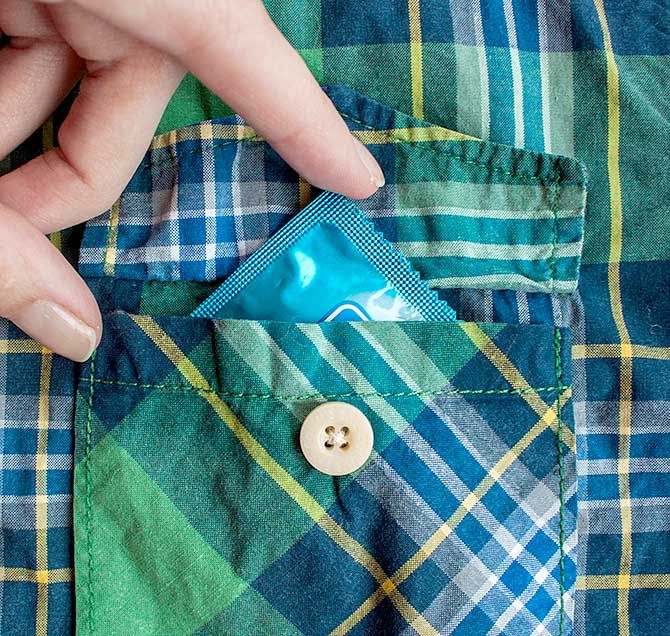Why does any talk about reproduction, or condoms, or sanitary napkins make us so uncomfortable, wonders Divya Nair.

I still remember the first time I saw an ad for a sanitary napkin on television. For several years, I had no idea how useful that white rectangular shaped piece would be or what exactly the blue ink signified.
The brand name itself signalled it was something secretive.
As I grew older, I became curious when I saw my mother and cousins secretly exchange rectangular pieces of cloth stuffed with cotton.
I saw how they always hid it between clothes or pushed it into the furthest corner of the wardrobe, away from prying eyes.
Even today, the pharmacist who sells sanitary pads wraps it in a newspaper as if it is something illegal.
No one then really answered my question about what that rectangular white piece actually was. I'd always have to settle for, 'You'll know when you grow up.'
When I got my first menstrual cycle in class 7, I saw blood in my panties and thought I had cancer.
I came out of the washroom crying and hugged Amma tight, thinking my days were numbered.
Amma and her friend, who comforted and gave me my first lecture on puberty, laughed at my innocence.
Of course, I was embarrassed. More than that, I was angry because I had been so naïve and ignorant.
In the early 90s, when the world wide web was a luxury for us, films and newspapers delivered information about cancer as a life threatening disease and hardly anything about puberty.
I grew up wondering why no science textbooks informed us about this important phase of our lives.
I cringed when I had to use cloth napkins. I cried and complained when I had to wash them clean and dry them in a corner where no one could spot them.
If we were in my father's village, my mother and I would wake up early in the morning and burn those homemade napkins far away in the field. I dared not question these ignorant malpractices.
Soon, I found support from girls of my age who had similar stories to share. Once I was allowed to use sanitary napkins, I never went back to cloth pads.
Now that I was finally using the product I had seen on TV, I still could not understand why they chose blue ink to show the stains. Why not show red ink? Wouldn't that be more real?
I cannot describe how much better and confident I felt after graduating from cloth pads to sanitary pads.
But speaking about puberty or napkins was still uncool. In schools and at outdoor events, we'd stop talking about it when boys passed by.
We'd use sign language to ask each other if our uniforms were stained. Or if we felt uneasy or wanted to borrow a napkin.
This secrecy made the boys curious.
Soon, there was an unseen wall between the boys and girls in our class.
Neither side was willing to breach this barrier.
The boys didn't know why some girls did not participate on Sports Day and girls never found the courage to ask the boys to help them buy napkins or simply explain why they were so irritable on some days of the month.
Even the mandatory sex education session by a sanitary napkin brand didn't help.
The team distributed free napkins and a booklet which I read and reread a dozen times so that I could absorb every bit of information on how to cope during menstruation.
That was the first time I knew the dictionary word for what was happening to our bodies every month.
I read about tampons, which were probably not even available for us to try.
In Class 9, the chapter on reproduction was omitted from the syllabus. Probably, no teacher felt comfortable tackling the topic.
Our combined hopes of getting schooled on human body parts and their functions were washed away.
In Class 12, the biology teacher did brave the chapter on human reproduction. But not once in the 45 -minute session did she look at the class.
Facing the black board, she illustrated the male and female reproductive organs, spending a good 40 minutes writing what was already in the textbook and highlighting that we learn it by heart.
When she turned, she looked at the table, attempting to gather her belongings.
"Any questions?" she asked the class, in a feeble and discouraging tone. Before anyone could raise their hand, the bell rang and she heaved a sigh of relief.
It was frustrating that no one was comfortable talking about the human body even in a class of 120 plus students, some of whom aspired to be doctors and medical officers.
Thank God I took tuitions in Class 12. That's where I met a biology teacher, a cancer survivor who taught us about human sexual reproduction in the most non-embarrassing manner.
"It's like any festival. The uterus prepares itself every month to conceive. If the sperm doesn't reach the egg, the egg is not fertilised. All the stale food (blood) is flushed out of the system. Every month, the uterus goes through the same drill."
"Ziddi (Stubborn) fellow, doesn't give up; tries every month," she'd said.
For the first time, the class united in silence and absorbed this information.
I am sure many of us had the same thoughts running on our minds when we first saw those Nirodh advertisements on TV. Or any of those condom ads.
I had my first experience of understanding condoms when I was working on a documentary on eunuchs and sex workers.
"Isko balloon mat samajhna; isko aise use karte hain (Don't think this is balloon; this is how it is used)," transgender activist Laxminarayan Tripathi had said, while demonstrating how a condom was to be worn, on her thumb.
"Aur bewakoofon, isko ungli me nahi daalte (Don't think it is used on your finger)," she'd laughed.
Sex education can be as simple as that.
All these years, I have hoped that, someday, some one will replace the misguiding blue ink on a sanitary napkin commercial.
I also hope that, for once, we have an ad where a boy or a girl walks into a chemist shop and sensibly asks for a condom. No Sunny Leone. No Bipasha Basu. No nonsense.
How about an ad where the mother or father of the bride gifts the newly-weds a condom on their wedding day, followed by a message on safe sex?
Or will that also be called indecent, unsanskari and fit to air only after 10 pm?
Lead image used for representational purposes only. Image: Astryd_MAD/Pixabay.com










